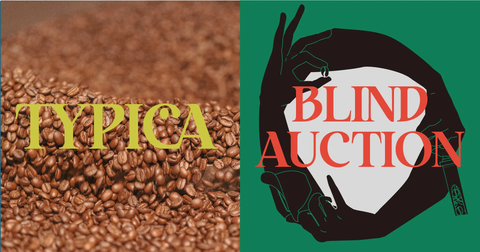We spoke to TYPICA, a partner of Standart Issue 25, which operates an online platform, open to all producers and roasters, that makes the ideal of real direct trade easier than ever, even for as little as one unit of jute bag (60 kg). We asked the TYPICA team about their 'blind auction function', which went live in March this year.
What is the 'blind auction' feature that was implemented on the TYPICA platform this year?
The general transaction flow in TYPICA is that the producer sets the selling price and the roaster checks the samples before making a purchase. In the case of a blind auction, a feature that was launched to the public in March this year, coffees that meet certain criteria (about 10-20% of the available coffees) are traded in an auction format. In selecting coffees for the auction, we may suggest that producers sell some of the coffees we have sampled, or producers may tell us that they wish to sell certain of their coffees.
'Producers in El Salvador have told us that the presence of the blind auction function has increased their motivation, while in Ethiopia, producers have informed us that they have decided to give textbooks and supplies to schools in Sheka, Sidamo, and Yirgacheffe with their auction bonuses. We were motivated by the development in a direction we had not initially envisaged.'
As the word 'blind' implies, during the auction the bidding proceeds without any visibility of who has bid or at what price. Prospective buyers bid what they consider to be the best price based on their own evaluation criteria, and the successful bidders are decided in order of bidding price.

What kind of benefits does the auction’s being 'blind' provide?
The main aim is to curb excessive price competition. Even if you have never participated in a coffee auction, if you think of online auctions, you will know that there is a rush of bids at the end of the auction, and when new bids come in, the end time is extended and the price goes up even further. Also, even if the identity of the bidders is unknown, it is not unusual for them to feel a sense of not wanting to lose if they know who they are competing against by username or other information.
But there was a question as to whom that system was for, so we asked each potential buyer to offer what they thought was the best price, and we made a rule that the successful bidder would be decided on the basis of that.
The only condition regarding price is that the starting price reflects the producer's costs, and ensures that everything above the starting price is returned to the producer. This means that if a higher price is achieved, the surplus is paid directly to the producer, creating an incentive to produce higher quality coffee.
There are many auctions in the coffee industry, large and small, but what makes TYPICA’s blind auctions different, apart from the fact that they are blind?
In terms of logistics, the blind auction and regular sales take place at the same time, so green beans purchased in the regular trade and those won at the auction can be delivered at the same time, reducing delivery costs and environmental impact.
The TYPICA website also features interviews with individual producers, so roasters can participate in the auction not only with hard information about the farm, the variety grown, and the processing method, but also with the people behind the beans.
It has been a few months since the blind auction function was launched - can you tell us about the results of the auctions that have taken place so far?
In the first blind auction held from 8 to 15 March, 10 lots from the Acacia Hills coffee estate in Tanzania were offered, with roasters from nine countries participating and 49 bids received. The most popular lot fetched 2.5 times the starting price, and the majority of the other lots were priced over 1.5 times the starting price. Since then, blind auctions have been held for coffees from Ethiopian and El Salvadorian producers, with prices exceeding the starting price across the board.
Producers in El Salvador have told us that the presence of the blind auction function has increased their motivation, while in Ethiopia, producers have informed us that they have decided to give textbooks and supplies to schools in Sheka, Sidamo, and Yirgacheffe with their auction bonuses. We were motivated by the development in a direction we had not initially envisaged.

Do you have any plans to update the blind auction function in the future?
At the moment, the winning bidder is decided according to the bidding price, but in the future, we plan to develop a function that allows producers to learn more about the roaster and choose whom to sell to, taking into account not only price but also values, ethos, and other intangibles. This idea was inspired by producers who said they wanted to do long-term business with people they could trust, and not just with those who paid the most.
TYPICA has a meeting place called 'Meet the Producers' where producers and roasters can exchange opinions when new coffee sales start, and we will continue to listen to the opinions of both parties to find a better way to trade coffee and communicate with one another.
This interview was published in proud partnership with TYPICA.



